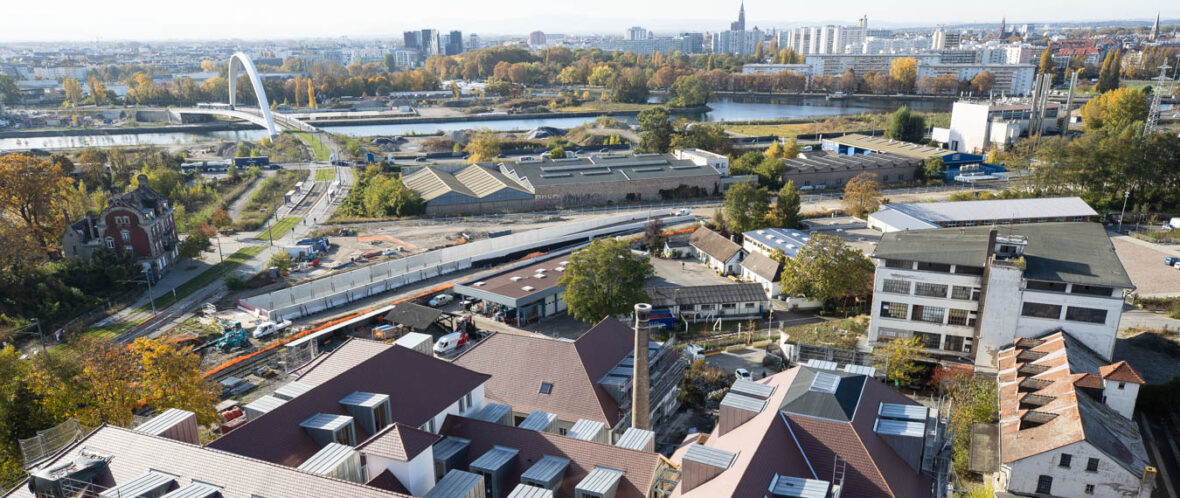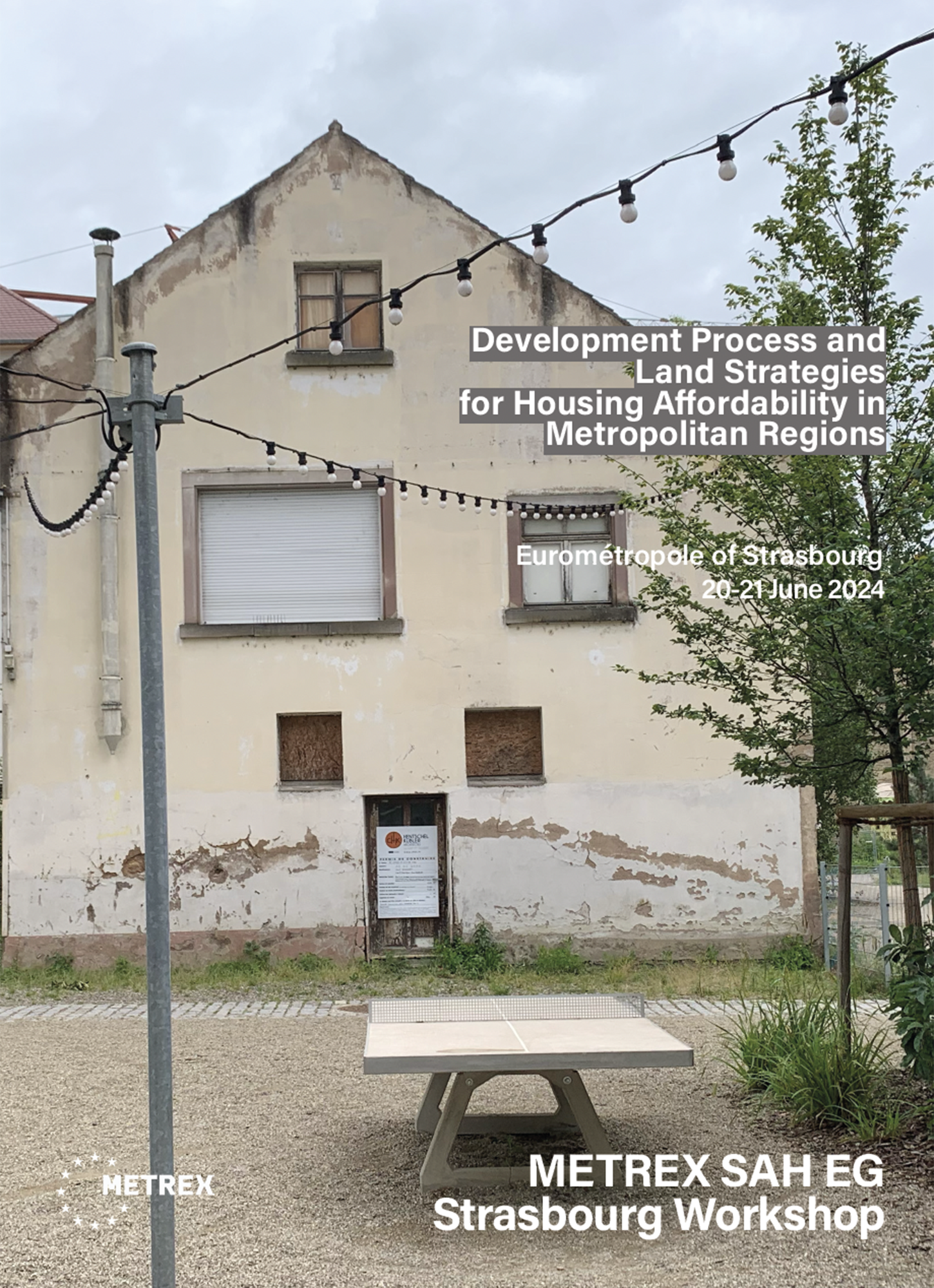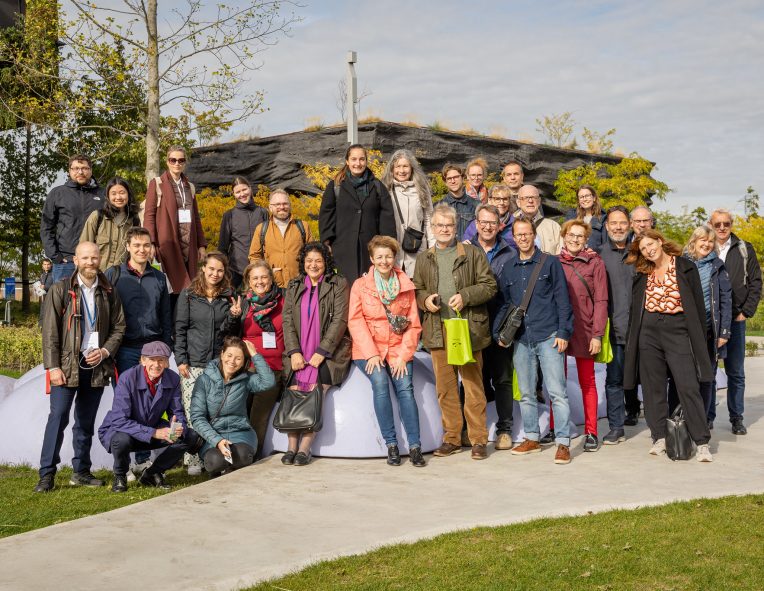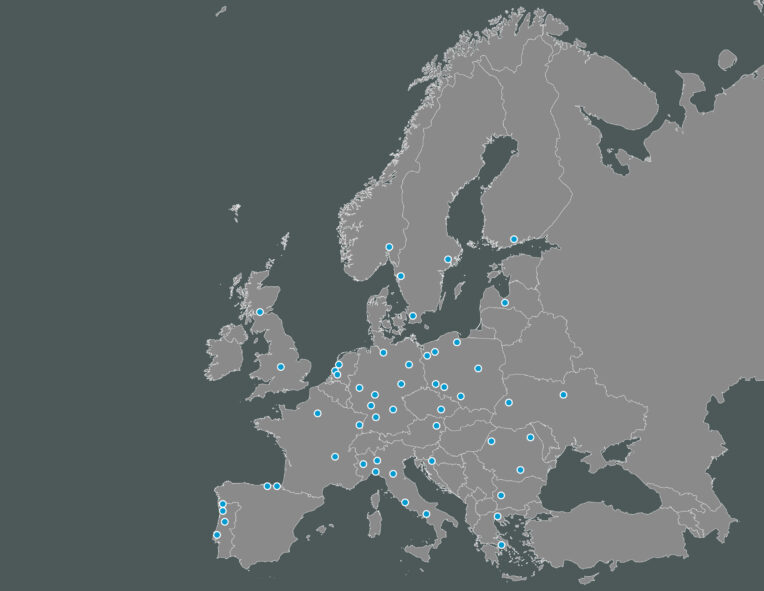Development Process and Land Strategies for Housing Affordability in Metropolitan Regions
The Strasbourg Workshop is part of a series of get-inspired online sessions and live activities organized by the METREX Sustainable and Affordable Housing (SAH) Expert Group established with the aim to explore alternative solutions on land policies and instruments that can help tackle the housing and affordability crisis at the metropolitan scale.
More info about SAH program and the past events is available here.
Housing is usually a municipal government prerogative. However, there is emerging evidence that metropolitan governments have a better understanding of intermunicipal or regional operators that are at the forefront of housing development, such as financial organizations, landowners and developers. This group of stakeholders usually cross municipal boundaries and even national borders in case of large construction companies and investors. At SAH we therefore propose a new approach, aiming to engage with these sectors and find opportunities and solutions to deliver regional affordability.
It is worth mentioning that Eurometropole Strasbourg will be the first test case among the METREX Members where the SAH theory/practice framework will be applied and the outcome will be presented at the Social Housing Festival in Dublin in 2025.
The Goals
This workshop aims to ground the theoretical approaches viewed in previous sessions and present the Metropolitan Region of Strasbourg as a case study. It is intended as an applied learning process developing across a number of steps which include the contributions of international and cross-sectoral practitioners and observers, leading to a site-specific analysis and reflection on the local context offered by the metropolitan region of Strasbourg.
By bringing together both local and international experts on land management and housing, the 2-day workshop in the Eurométropole of Strasbourg is intended as an executive training workshop using applied learning techniques that are based in current theories and exemplar practices specifically selected for the event. In addition, it will provide new tools to participants and enable an in-depth discussion and reflection of the local context.
The aim of this activity is to trigger an integrated approach and multi-actor exchange while offering the opportunity to raise questions and openly uncover current opportunities and hurdles, as well as finding ways of maximizing/diminishing their impact on housing affordability at metropolitan level.
International experts include:
- Claudia Murray: Research Fellow at the Department of Real Estate and Planning, Henley Business School, University of Reading, UK, and METREX SAH EG Coordinator
- Theo Stauttener, partner at Stadkwadraat, NL, is responsible for strategy development with specific expertise in financial management and risk management of the development process,
- Prof. Erwin v/d Krabben is Professor of Planning and Property Development in the Department of Planning at Radboud University, NL
- José Manuel Ferreira, architect and urban planner, expert on EU projects, works in planning, mobility and housing policies, at Municipal and Metropolitan level since 1997. Participated and coordinated several Municipal, Metropolitan and Regional, European projects.
The Program in a nutshell:
- Day 1 (June 20)
We will explore and delve into the theoretical underpinning of the development process and use it to analyse the Housing First approach that is used to reduce homelessness.
The final aim is to develop a joint manifesto of policy recommendations for the effective implementation of Housing First in Strasbourg.
Expected outcomes:
Using participatory tools, the group will work in teams and deliver:
1. a mapping of actors/institutions/policies used by the scheme.
2. a mapping of opportunities/constrains in the context of Strasbourg.
- Day 2 (June 21)
We will move from the process of development to the most niche topics of land management, including tools and instruments. The session will focus on different land holding systems including leasehold, freehold and trust systems, presenting distinctive international approaches (Dutch and British cases). This will be followed by a guided roundtable discussion on adaptability/transferability to the local context.
At the end of the session, the participants will deliver:
- An agreed list of common terminology consisting of a comprehensive list of land management tools that are applicable to the Dutch, English and French contexts.
- An understanding of the leasehold, freehold and trust system
- A list of opportunities/barriers for the transferability of the above tools to the French system.
The Objectives
By the end of the session, participants will be able to:
- Use structure and agency models for stakeholder/institutional mapping.
- Use structure and agency to elicit opportunities and barriers in current policies/programmes.
- Understand current innovations in the Dutch system of land management.
- Enhance their understanding of land management tools in their own language.
Assess the transferability of leasehold, freeholds and trust systems to their own contexts.
The final report
This workshop aimed to ground the theoretical approaches used as analytical frameworks in the development process and, in particular, Anthony Giddens’ structure and agency methods.
The workshop included several organisations and civil servants from the Metropolitan Region of Strasbourg, using two topics as case studies: 1) the implementation of the Housing First approach and 2) the land management policies and strategies currently employed by Strasbourg. Before the workshop, participants received an online presentation as well as reading material on structure and agency and the models of the development process as understood by Patsy Healey. Also, before the workshops, relevant participants were asked to submit material regarding housing and land policies that could inform the conversation, not only as pre-reading material for the organizing team but also for international guests. During the workshop itself, the delivery team organises the session following a series of activities, including the mapping of actors and institutions relevant to each case study (1 and 2) and designing a semi-structured questionnaire to guide conversations and encourage cross-organizational conversations as well as self-reflective thinking.
By bringing together both local and international experts on housing policy and land management strategies, the 2-day workshop in the Eurométropole of Strasbourg was intended as an executive training workshop using applied learning techniques that are based on current theories and exemplar practices specifically selected for the event. In addition, the grounding of structure and agency theories by empirically operationalizing it in a context familiar to participants, facilitated the learning process whilst providing a new tool to analyse local development processes, their institutions, and the agency of actors involved.
By engaging housing and land organisations involved in policy and management in Strasbourg, the workshops reinforced current integrated approaches and multi-actor exchange while offering the opportunity to raise questions and openly uncover opportunities and hurdles, as well as finding ways of building resilience to their impact on housing affordability at the metropolitan level.
The report is organised in different chapters and divided in Day 1 and Day 2:
Day 1 includes: Housing First Approach \Mapping the actors involved \Challenges – structural and cultural obstacles \Promising elements \Outcomes from the Participants’ Workshop Discussion
Day 2: Local and national and management tools \International experiences \Key-points emerged from the discussion \ Key takeaways from the Strasbourg workshop
Download the Report in PDF version
Copyright image: © Jérôme Dorkel / Strasbourg Eurometropole




